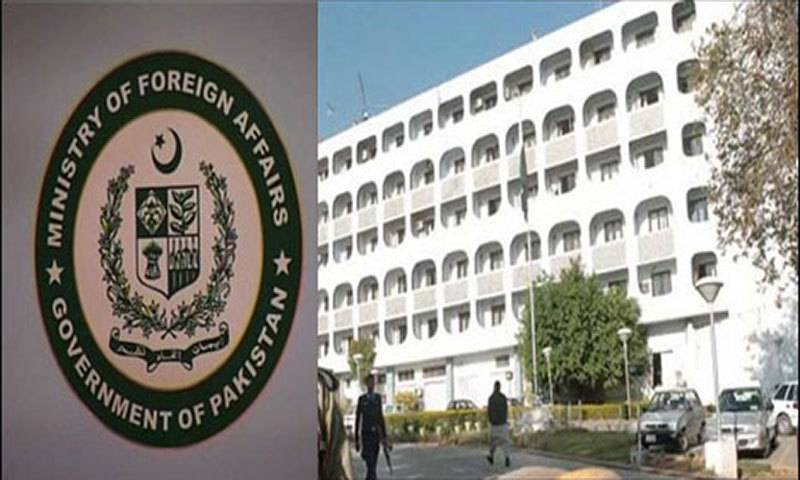ISLAMABAD - Pakistan has asked India not to spread war hysteria amid peace efforts by the doves from both the sides, diplomatic sources said.
Senior officials at the foreign ministry told The Nation that India was contacted through diplomatic channels to protest against Indian army chief Bipin Rawat’s irresponsible statement wherein he dared Pakistan to a nuclear encounter.
He told reporters in New Delhi the other day that Indian army was ready to call Pakistan’s ‘nuclear bluff’ and violate the border to carry out any operation inside Pakistan.
“India has been told that such statements will only worsen the tension. These statements invite reaction and counter-reaction,” an official said.
Another official said that India was advised not to create an ‘atmosphere of uncertainty’ as regional issues cannot be resolved without peace and dialogue.
Foreign Minister Khawaja Asif and military spokesperson Maj-Gen Asif had given a shut-up call to India soon after General Rawat’s statement. Both of them urged India not to underestimate Pakistan’s conventional and non-conventional military strength.
Talking to reporters in New Delhi on Saturday, Rawat dismissed assertions that Pakistani tactical nuclear weapons had effectively countered India’s ability to impose a conventional military war on Pakistan.
“We will call the (nuclear) bluff of Pakistan. If we will have to really confront the Pakistanis, and a task is given to us, we are not going to say we cannot cross the border because they have nuclear weapons. We will have to call their nuclear bluff,” he said.
Pakistani Foreign Minister Khawaja Asif called Rawat’s statement “very irresponsible” in a tweet the same day.
“[This] amounts to invitation for nuclear encounter. If that is what they desire, they are welcome to test our resolve. The general’s doubt would swiftly be removed, inshallah [God willing],” Asif vowed.
The Pakistan army also criticised the Indian general’s comments, reiterating that its nuclear weapons had deterred India’s massive army from launching another conventional war against Pakistan.
“Should they wish to test our resolve, they may try and see it for themselves,” ISPR DG Asif Ghafoor said on state-run Pakistan Television.
“We have a credible nuclear capability, exclusively meant for threat from east [India]. But we believe it’s a weapon of deterrence, not a choice. They [Indians] must not remain in illusion,” he added.
On Sunday, Interior Minister Ahsan Iqbal said that nuclear powers across the world show responsible behaviour but Rawat’s statement proves that India is an “irresponsible nuclear power”.
Speaking to media in Lahore, Ahsan further said the statements by Indian army chief and US President Trump seek to pressurise Pakistan.
Pakistani officials maintain that the nation’s short-range battlefield NASR (Hatf-IX) nuclear-capable missile would deter the bigger neighbour from imposing a sudden, limited assault with conventional forces under New Delhi’s “Cold Start” doctrine.
Pakistan’s military announced last year that it had enhanced NASR’s flight manoeuvrability and extended its range to 70 kilometres from 60.
Minister for Defence Production Rana Tanveer Hussain said on Sunday that Pakistan has advanced nuclear and missile technology that enables it to target every city of India.
Addressing a public gathering in Sheikhupura, he said that Indian army chief’s assertion is irresponsible and threatening and it would be taken seriously.
Peace efforts
Last month, Pakistan’s National Security Adviser Nasir Khan Janjua and his Indian counterpart Ajit Doval held an unannounced meeting in Bangkok to build the trust level. Reports said Janjua and Doval discussed the Kashmir issue, terrorism and overall bilateral ties.
Days before the meeting with Doval, Janjua had said the back-channel diplomacy with India was on where the solution to the tension was being discussed.
Earlier, Pakistan had organised a ‘family reunion’ for convicted Indian spy Kulbushan Jadhav – dubbed as India’s ‘face of terror’. Jadhav’s mother and wife – Avanti Jadhav and Chetenkul Jadhav –were allowed to sit across a glass barrier for 40 minutes and speak to each other.
Foreign Office spokesperson Dr Mohamed Faisal said Pakistan wanted talks with India and was committed to resolving all the issues peacefully. “They (India) are the ones who always deny the dialogue option,” he said.
History of recent spike in tensions
Tensions between Pakistan and India have been high since the killing of a Kashmiri freedom fighter, Burhan Wani, in July last year. An attack on Indian forces in September 2016 - that killed 19 soldiers in Uri area of held Kashmir - further heightened the tensions.
Later, India started violations at the Line of Control that left people dead on both sides. India also claimed it had carried a ‘surgical strike’ to avenge the Uri attack. Pakistan rejected the Indian claim.
Pakistan has been trying to engage India in dialogue to defuse tension but India is defiant to stay away from the talks table. New Delhi is also not ready to discuss Kashmir, the core issue between the two nuclear-armed neighbours.
International Affairs expert Dr Pervez Iqbal Cheema said India had always been speaking in a threatening tone to press Pakistan. He said India had never shown seriousness to resolve the Kashmir issue which was a threat to peace in the region.
“Instead of supporting the peace efforts by Pakistan and listening to the saner elements within India, they (India) use abusive language to pressurise Pakistan. They (India) should know we are a nuclear power. Our forces are capable to defend the country,” he said.
US and its equipment ‘both are unreliable’
Minister for Defence Production Rana Tanveer Hussain in his public address in Sheikhupura on Sunday said the US equipment was unreliable like America herself as terror-war ally.
The defence items purchased from the US do not work in times of need, he said. The US herself too was not a trustworthy partner, he added.
“Our defence production is increasing. The army’s 80 percent needs are being met domestically,” he said, adding that Pakistan is among the seven countries of the world that make their own fighter aircraft.
India asked not to spread war hysteria
SHAFQAT ALI/Agencies






